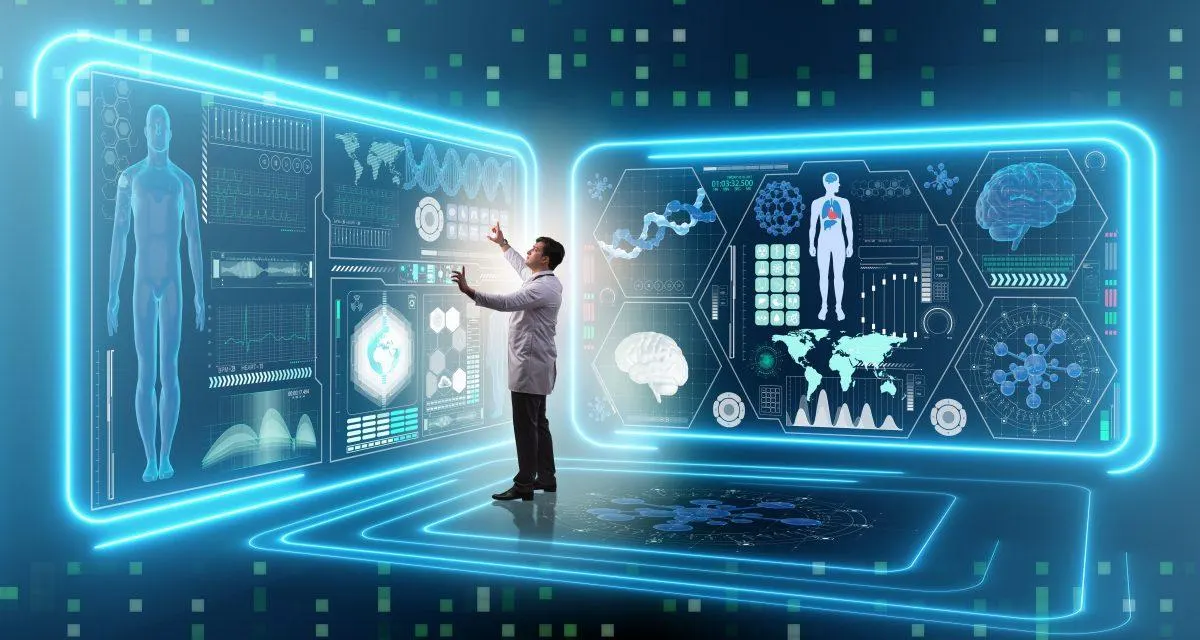AI Impact on Patient Medical Records In today’s rapidly evolving world, the integration of Artificial Intelligence (AI) into various sectors has been nothing short of revolutionary. One of the most groundbreaking applications of AI is its impact on patient medical records, which is reshaping the landscape of healthcare as we know it. With its potential to enhance accuracy, speed up processes, and provide invaluable insights, AI is ushering in a new era of patient care and medical record management.
Gone are the days when medical records were confined to handwritten notes and scattered files. With the advent of AI, patient medical records have undergone a dramatic transformation, streamlining processes and improving patient outcomes. From diagnosis and treatment to research and administrative tasks, AI is leaving an indelible mark on the healthcare industry.

**1. Enhanced Data Management
AI-powered tools have revolutionized the way medical records are managed. Manual data entry and retrieval processes are being replaced by intelligent algorithms capable of swiftly and accurately organizing vast amounts of patient information. This not only reduces the risk of errors but also frees up valuable time for healthcare professionals to focus on patient care.
**2. Precision Diagnosis
The analysis of patient medical records can be an arduous task for healthcare providers. AI steps in with its ability to identify subtle patterns and anomalies that might be overlooked by the human eye. Through machine learning algorithms, AI can assist doctors in making more accurate and timely diagnoses, thereby minimizing the risk of misdiagnosis and improving patient outcomes.
**3. Personalized Treatment Plans
No two patients are alike, and AI recognizes this fact. By analyzing historical medical records and treatment outcomes, AI can assist healthcare providers in creating personalized treatment plans that cater to individual patient needs. This tailored approach ensures that patients receive the most effective care, leading to better recovery rates and reduced hospital stays.
**4. Predictive Analytics
AI’s predictive capabilities are invaluable in healthcare. By analyzing patient medical records, AI can forecast potential health issues a patient might face in the future. This proactive approach enables medical professionals to intervene early, thereby preventing the development of severe conditions and improving long-term patient health.
**5. Research and Development
The integration of AI with patient medical records is a goldmine for medical research. AI-powered algorithms can comb through massive datasets to identify trends, correlations, and potential breakthroughs. This expedites the process of drug discovery, treatment development, and medical advancements, ultimately benefitting patients on a global scale.
**6. Security and Privacy
With the increased digitization of medical records, concerns about data security and patient privacy have risen. However, AI comes to the rescue yet again. Advanced encryption techniques and AI-driven security systems provide robust protection against unauthorized access and data breaches, ensuring patient information remains confidential.
The AI impact on patient medical records is an undeniable game-changer in the realm of healthcare. From efficient data management to precise diagnoses and personalized treatment plans, AI’s transformative influence is evident at every step. As technology continues to evolve, the marriage between AI and medical records holds the promise of a healthier, more informed, and better-connected healthcare ecosystem. By embracing AI’s capabilities responsibly, we can look forward to a future where patient care reaches unprecedented heights.
In the dynamic landscape of healthcare, the integration of Artificial Intelligence (AI) has catalyzed an extraordinary transformation. Among its myriad applications, the profound impact of AI on patient medical records stands as a testament to its potential in reshaping healthcare as we know it. Through enhanced accuracy, expedited processes, and unparalleled insights, AI is paving the way for a new era of patient care and medical record management that holds the promise of improved outcomes and streamlined operations.
The metamorphosis of patient medical records from traditional handwritten notes to AI-driven digital repositories is nothing short of remarkable. AI has unlocked novel dimensions in healthcare by optimizing the management, analysis, and utilization of patient information. This article delves into the multifaceted AI impact on patient medical records, exploring its far-reaching implications for healthcare providers, researchers, and patients themselves.
1. Revolutionizing Data Management
Traditional record-keeping methods are prone to inefficiencies and errors, often leading to compromised patient care. The advent of AI heralds a new era of data management, where intricate algorithms swiftly and accurately organize vast volumes of patient information. Automation eliminates redundancy and streamlines processes, freeing healthcare professionals from administrative burdens and enabling them to allocate more time to patient-centered tasks.
2. Precision Diagnosis Through AI
Diagnosing complex medical conditions demands a meticulous examination of patient medical histories. AI’s prowess in pattern recognition and data analysis empowers healthcare providers to make highly accurate diagnoses. By analyzing a patient’s historical records, AI algorithms can identify subtle trends and correlations that might elude human perception, ensuring timely and precise diagnoses that are pivotal in devising effective treatment strategies.
3. Personalized Treatment Trajectories
Healthcare is inherently individualistic, with patient characteristics and medical histories varying significantly. AI leverages patient medical records to create personalized treatment plans that align with each patient’s unique needs. By amalgamating historical data, AI aids healthcare providers in tailoring interventions that maximize treatment efficacy, thereby expediting recovery and minimizing adverse effects.
4. Predictive Analytics and Preventive Care
AI’s predictive prowess is a cornerstone of its impact on patient medical records. By analyzing extensive datasets, AI can forecast potential health complications an individual might face. This empowers healthcare professionals to implement preventive measures, mitigating the development of serious conditions. Consequently, patients experience improved long-term health outcomes, reducing healthcare costs and burdens on medical facilities.
5. Fueling Research and Advancements
Patient medical records, when harnessed by AI, become invaluable repositories for medical research. AI algorithms can sift through copious data, unveiling hidden trends and correlations that drive innovation. From drug discovery to treatment optimization, AI expedites research processes, enabling medical breakthroughs that enhance patient care and transform the medical landscape.
6. Navigating Security and Privacy
The digitization of medical records has raised concerns about data security and patient confidentiality. However, AI’s integration bolsters security measures. Advanced encryption techniques and AI-driven security protocols fortify data against unauthorized access and breaches. This not only safeguards patient privacy but also fosters trust in AI-driven healthcare systems.
7. Fostering Interconnectivity and Continuity
AI-infused patient medical records foster interconnectivity among healthcare providers and institutions. Seamless data sharing expedites care transitions and ensures comprehensive patient histories are accessible, regardless of location. This fosters continuity of care and minimizes redundancies, leading to enhanced patient experiences and improved outcomes.
The intersection of AI and patient medical records stands as a beacon of transformation in healthcare. From data management to diagnostics, treatment personalization, and predictive analytics, AI’s imprint is evident across the healthcare spectrum. This symbiotic relationship holds the potential to elevate patient care to unprecedented heights, as long as responsible implementation and ethical considerations guide its evolution. As AI continues to evolve, healthcare stakeholders must collaborate to harness its capabilities judiciously, ensuring a future where patients benefit from a synergy of cutting-edge technology and compassionate care. The dawn of AI-enhanced patient medical records signals a brighter, healthier future for individuals and the healthcare ecosystem as a whole.
Read More : OpenAI Partnership with AJP(American Journalism Project )to support local news

